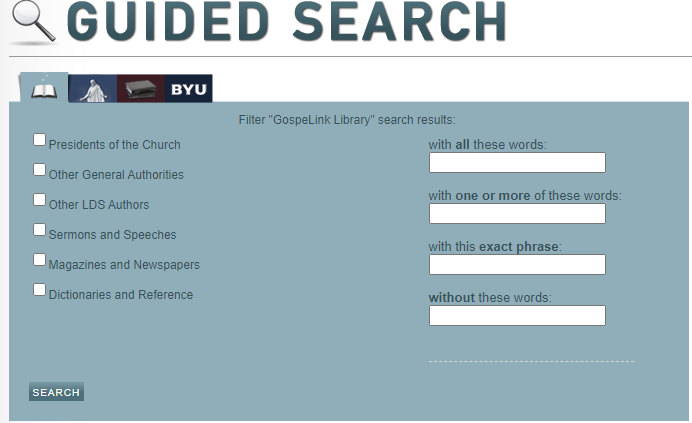

askandanswer
Members-
Posts
4222 -
Joined
-
Last visited
-
Days Won
13
Everything posted by askandanswer
-
When it comes to digital gospel libraries I recommend https://www.gospelink.com/. Its become quite old now and I don't think its being regularly added to but it still contains a great deal of accessible material. I would be interested in hearing what other sources people have found to be helpful and reliable.
-
Bruce R. McConkie, Millennial Messiah, p. 279-280 ) As quoted on page 5 (or p.439) of https://www.ldsgospeldoctrine.net/bwc/bwc-ot-35.pdf
-
Ive sometimes wondered if the "specialness" of Jesus might be because He was the Father's son when the Father was a mortal. We know that God has a wife. Perhaps He also had a son.
-
Coincidently, from my readings this morning Job 5:6 Can that which is unsavoury be eaten without salt? or is there any taste in the white of an egg? 7 The things that my soul refused to touch are as my sorrowful meat.
-
refried bananas? banana fritterito?
-
No, it's really not a tie, its a banana fritter. Who would eat a tie?
-
Well, if I squint at in a certain way while in a dark room, and put on my child's glasses, it looks more like a banana fritter than a Tostaco
-
It seems like they just keep finding moore and moore ways to stack moore chips into evermoore smaller areas. Mooreover, I suspect that this trend will continue for some time. Its just one of many ways of doing more with moore.
-

Have we decided to live the lesser law?
askandanswer replied to mikbone's topic in LDS Gospel Discussion
Well after reading all of the above posts and carefully considering the counsel of our church leaders I have firmly resolved that never in this life will I be a stay at home mum. -
Another way of putting that is that a girl would never be alone with @LDSGator
-
I think the real question is what happens on your next trip alone, what happens next time you are in a similar situation for a prolonged period of time, what happens next time a man tries to flirt with you? And you dont have to be on a long flight for this to happen, it could happen next time you go shopping. Having once participated and enjoyed it, will you want to do so again? Will this be a once only experience or the beginning of a pattern? Some possible responses to those questions could be a) I feel bad about this, that's my conscience telling me that it was wrong, so I won't do it again, and I'd better take some preventative steps to reduce the likelihood of it happening again. b) That was a test, I enjoyed it, I passed the test, so if the opportunity arises, I'll do it again or c ) I enjoyed that, nothing bad happened, I want it to happen again so I'll look for or create similar opportunities. B and C are dangerous choices. Any sort of action that releases endorphins often becomes an action that we want to do more of. For some people it only takes one drink to become an alcoholic. Welcome to the forum, its a great place to get advice and discuss ideas.
-
Count your many blessings, name them one, by one...........
-
I’m in the process of marking 148, 1,500 word first year “reflective essays” in which students were asked to watch, reflect, and respond to this video by Dr Wray. In this video Dr Wray raises the question about the morality of having children during a time of climate change. I didn’t keep exact track of the figures but my feel is that probably a little over 2/3rds rejected the idea that climate change should be a significant consideration to take into account when deciding whether or not to have children. Again, I haven’t looked at the results too carefully, but my impression is that by far the largest percentage of this 2/3rds would have been from non-western, third world, mostly Asian countries. Most of those who seemed persuaded by the idea that this was not a good time to have children were white western females.
-
Thanks for posting this @mikbone I was unaware of this guy. After reading your post I watched two of his episodes.
-

Question concerning “Continuing Revelation”
askandanswer replied to Maverick's topic in LDS Gospel Discussion
What I'm suggesting is the teaching of additional light and truth to those who have already demonstrated an ability to discern truth from error does not generally cause the sort of reactions that you claim were caused by teaching the Adam-God theory. So that raises a question in my mind as to whether what was taught was indeed light and truth. It doesn't seem to be quite consistent with Doctrine and Covenants 88:40 If I had wanted to suggest something along the lines of what you have written I would have written something like "As the prophet of the church, Brigham Young may have taught things that might have sounded like falsehoods to some people and that there is some reason to suggest that he may have taught these things for a prolonged period and in various places." " -

Question concerning “Continuing Revelation”
askandanswer replied to Maverick's topic in LDS Gospel Discussion
The teaching of additional light and truth to those who have already demonstrated an ability to discern truth from error does not generally cause the sort of reactions that you claim were caused by teaching the Adam-God theory. So that raises a question in my mind as to whether what was taught was indeed light and truth. It doesn't seem to be quite consistent with Doctrine and Covenants 88:40 For aintelligence cleaveth unto intelligence; bwisdom receiveth wisdom; ctruth embraceth truth; dvirtue loveth virtue; elight cleaveth unto light; fmercy hath gcompassion on mercy and claimeth her own; hjustice continueth its course and claimeth its own; judgment goeth before the face of him who sitteth upon the throne and governeth and executeth all things. -

Question concerning “Continuing Revelation”
askandanswer replied to Maverick's topic in LDS Gospel Discussion
I like to think that I'm too well-mannered to laugh at the views and opinions of others, but sometimes the temptation arises. To think that God would allow His prophet to teach false doctrine about His character and nature for 25 years, especially after he and His Son appeared in person to Joseph Smith - well that's an example of when I'm tempted. To quote again from a previously quoted from talk: Fourth: The prophet will never lead the Church astray. President Wilford Woodruff stated: “I say to Israel, The Lord will never permit me or any other man who stands as president of the Church to lead you astray. It is not in the program. It is not in the mind of God.” (The Discourses of Wilford Woodruff, selected by G. Homer Durham [Salt Lake City: Bookcraft, 1946], pp. 212-213.) If Brigham Young did indeed teach the Adam-God theory - and I have never looked into the matter myself, and nor do I intend to because it is so unimportant - and God allowed him to continue teaching this, I would be inclined to accept that there must be some truth to it. However, I say this from the position of one who has never looked at the idea or its associated teachings. -
From the ABC, Australia' government funded national broadcaster a few days ago: https://www.abc.net.au/news/science/2024-04-13/how-fast-can-a-womat-actually-run-faster-than-usain-bolt/103648118 How fast does a wombat really run? An investigation into the 40 kph phenomenon
-
I came to the same conclusion as @Vort and @NeuroTypical. And that led me to ponder how it can be said that as part of the atonement, Christ endured all and more that any mortal can, will, or has ever been called on to endure because all unbaptised mortals, and probably, occasionally, some baptised mortals, live without the influence or presence of any member of the Godhead in their lives. I’ve no doubt that Christ did descend below all, but I can’t see how He might have gone through the experience that is the ordinary condition of most mortals in not having a member of the Godhead present in their lives. My lack of understanding of this experience in no way reduces the reality of it, it just raises, what is for the moment, a question to think about.
-

Question concerning “Continuing Revelation”
askandanswer replied to Maverick's topic in LDS Gospel Discussion
I think we can agree on two things; 1) that the Adam-God theory was once taught in the church and 2) now it is not being taught in the church. I'm not sure, from those two facts, whether we can reliably come to the conclusion that it was a) taken away from the church and b) the reason for that presumed taking away was because of the wickedness of the church. -
Was there ever a time in the life of Christ when at least one member of the Godhead was not present?






